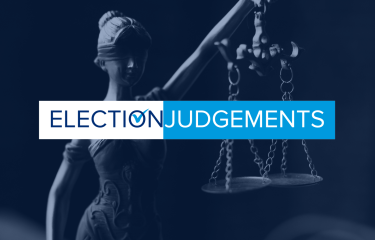
Introduction
Increasingly, election officials must grapple with attacks on the integrity of information around the election process. Such degradation of the election information environment sows doubt and preconditions public support for a possible fight in the courts, or on the streets, if the candidate or party in question is dealt a loss at the polls. 1 Moreover, manufactured integrity attacks are increasingly sophisticated and are starting earlier in the election process, a lie early and often approach that is insidious and difficult to counter. But the capacity to effectively counter these hedges is critical to maintaining democratic resilience. 2
Across jurisdictions, courts are increasingly caught up in this dynamic and are seeing more cases built on disinformation campaigns by political opponents during the election process. Either in anticipation of a judgment going against a party or in reaction to a judgment post-election, such campaigns attack the courts as an institution. Many recent elections also show aggressive attempts to politicize and weaken the electoral justice institutions that will adjudicate future contests, with such politically expedient or self-serving initiatives often drain[ing] strength and dynamism from the democratic system, diminishing its ability to withstand future political shocks. 3
Jurisprudence surrounding disinformation during elections is still evolving. In the courtroom, judges grapple with complex legal issues that bridge human rights law, constitutional matters, public administration law and election law. These cases also come at a time when ever more countries are adopting new laws and regulations and imposing restrictive legal frameworks, government censorship is increasing, and malign foreign and domestic influence in the information environment is exacerbating existing problems. Opposing parties, civil society organizations, and journalists also face increasing intimidation or even prosecution for allegedly making false statements while engaging in political campaigns, reporting, or covering campaign events. These events may extend to judiciaries as well. In Nigeria, for instance, Yiaga Africa, a non-profit organization that promotes participatory democracy, human rights, and civic participation, has observed a surge in attacks on the judiciary that actively cause harm and impugn the credibility of judges. Speaking about this phenomenon, Yiaga Africa Executive Director Samson Itodo noted that, due to increased litigation of cases during the 2023 Nigerian election, it is not surprising that politicians and other actors have focused attention on [the] judiciary, both in the pre-election and in the post-election period. 4
This paper's analysis of select jurisprudence reveals the need for election judges to have the resources and opportunities to familiarize themselves with evolving threats, whether foreign or domestic, to uphold electoral integrity and build resilient judicial institutions in advance of elections.5 It presents an analysis of disinformation cases from IFES database, ElectionJudgments.org, and discusses emerging challenges for judges in adjudicating these cases and the application of timely and effective remedies.
Citations
Lemargie, K. (2022). “Beware of Disinformation That Puts Democracy on the Line.” Foreign Policy.
Ibid
Ibid
African Electoral Justice Network meeting webinar, May 23, 2023.
Ibid



